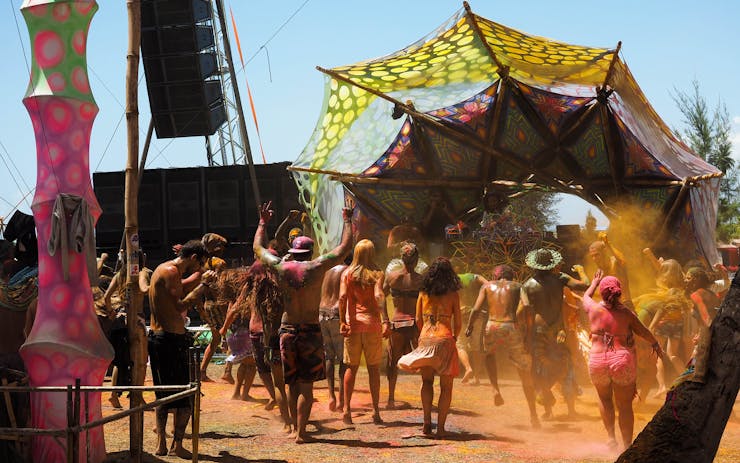If you’ve attended a major music festival over the past few years, your health and safety may have been safeguarded by volunteers with the Zendo Project—and you probably didn’t know it.
Launched in 2012, trained Zendo Project volunteers work with on-site medical and security personnel to care for festival attendees who experience negative drug-related episodes.
Zendo harm-reduction methods move beyond the old 'outdated ways of dealing with attendees having difficult psychedelic experiences.'
Instead of encouraging law enforcement authorities to get involved, the six-staffer Zendo Project practices and spreads the philosophy of harm reduction. It’s an approach defined by Stephanie Jones of the Drug Policy Alliance: Harm reduction “recognizes that despite all efforts to maintain a drug-free event, people will nonetheless use drugs, so our primary concern should be keeping these people and others around them safe.”
In addition to treating distraught attendees, the overarching point at festivals and other large public events is to decrease drug-related hospitalizations and arrests.
Zendo director Sara Gael has long been bothered by the arrests and other “outdated ways of dealing with attendees having difficult psychedelic experiences,” such as sedating and restraining attendees, she told VICE. These methods “are rooted in a misunderstanding of how psychedelics work and how they impact the mind,” she added.
Zendo also conducts in-person public harm reduction trainings for prospective volunteers. I attended one recently in Washington, DC, to get a sense of what they’re like.
Drugs or Medicine: What’s the Difference?
The training took place at a hotel near George Washington University’s campus in the Foggy Bottom neighborhood. Our session leader was Ryan Beauregard, a project manager and volunteer with the Multidisciplinary Association for Psychological Studies (MAPS). He addressed the room promptly at 5 p.m.

The crowd was racially diverse and ranged in taste and age from 20-something men sporting hoodies and shaggy beards, to 40-something men in business attire, to gray-haired women with nose rings.
Shop highly rated dispensaries near you
Showing you dispensaries near“What’s the difference between drugs and medicine?” Beauregard asked. A 20-something man called out: “Your intentions.”
Beauregard nodded; yes, exactly.
Volunteers Come From Far Away
Beauregard led the crowd in a meditation lasting about three minutes and asked everyone to pair up for three exercises. Partners engaged in a staring contest for one minute, then took turns asking each other to complete the phrase “You are…” in a rapid-fire manner for one minute.
Next, partners exchanged their tales of how they got to the training. From this author, there was a lot of nonsense about walking and riding the Metro (which, incredibly, functioned smoothly that evening).
My partner recounted her commute from her rural New Mexico town. “Made it with five minutes to spare,” she told me, chuckling. Another woman nearby flew in from Hawaii. Both came to Washington foremost for the training, they said.
Beauregard shared his story. A liberal arts college graduate (Claremont McKenna), he once worked with troubled teens before moving to Boulder, Colo., where he now works for MAPS. He once had his own challenging psychedelic experience, so powerful it lasted for several weeks. He grew up believing in what the oft-criticized D.A.R.E. program taught him about drugs, including psychedelics, and swam competitively in high school.
Key: Remove Stimulation
Beauregard detailed the role Zendo and its volunteers play at festivals. Inside the Zendo tent, “we’re trying to remove as much stimulation as we can,” he explained. That’s one of the four Zendo guiding principles for treating distraught festival goers. (The others: Talk through, not down; difficult is not bad; and sitting, not guiding.)
Some attendees took notes, while others nodded. Some shared their experiences handling psyched-out friends at festivals, and suggested apps that volunteers can download for practice.
How to reach fleeing psychedelic patients? 'We have runners,' said Zendo trainer Ryan Beauregard.
After explaining how people can apply to volunteer at a festival, he ran through a few hypothetical scenarios, Beauregard said the eight-hour volunteer shifts were rigorous. To track and catch up with fleeing psychedelic users, for example: “We have runners.”
We all gathered into a few groups to practice role-playing scenarios. One person in each group acted as a psychedelic user dealing with intrusive negative thoughts. Another played the role of a hyperactive day tripper.
“It’s O.K. to make mistakes,” Beauregard said after the groups re-assembled into one captive audience. “It’s O.K. to grow from them.”
Zendo staffers are searching for more East Coast events to attend, Beauregard said, in addition to the many West Coast events they already handle. He hoped many in the audience would be able to volunteer. “The experience,” Beauregard said, “really bonds us in a special way.”
Note: The Zendo Project training schedule is posted here. Volunteers paid between $30-$50 to attend the Washington training and MAPS also accepts donations.
Besides MAPS, other organizations allied with the Zendo Project include Bluelight.org, DanceSafe.org and Erowid.org.





